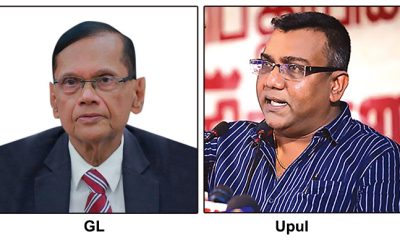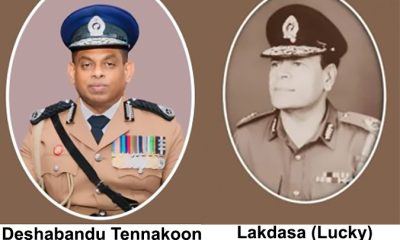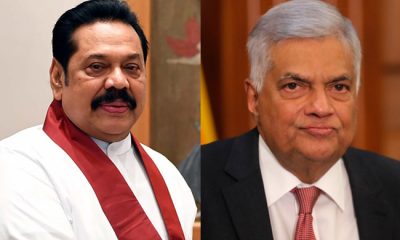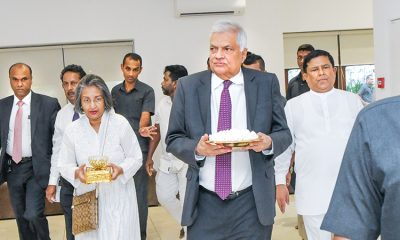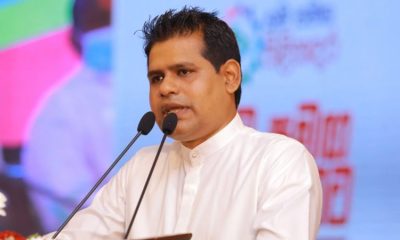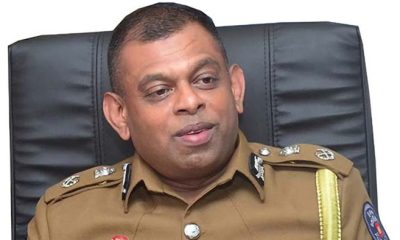Editorial
Welcome gavel blow

Friday 15th December, 2023
The Supreme Court (SC) has ordered acting IGP Deshabandu Tennakoon and three other police officers to pay two million rupees as compensation, out of their personal funds, to a person for illegal arrest, detention and torture at the Mirihana Police Station in 2011. Ordering the State to pay Rs. 100,000 to the petitioner as compensation, the SC has directed the National Police Commission (NPC) to take disciplinary action against all police officers including Tennakoon. The SC ruling has gladdened the hearts of all those who cherish democracy.
The SC has rightly ordered that Tennakoon and others pay compensation out of their own funds. Otherwise, public money would have been utilised for that purpose. The aforesaid case may not have had anything to do with the ruling party politicians, but governments usually leap to the defence of errant cops, who serve their interests at the expense of the public. It may be recalled that in 1983, the then UNP government did so when a stooge in the garb of a police officer was found guilty of having violated the fundamental rights of legendary leftist, Vivienne Goonewardene, who was roughed up during a peaceful protest in Colombo. President J. R. Jayewardene, who was intoxicated with power, unflinchingly had the culprit promoted subsequently.
The houses of the Supreme Court judges also came under attack when the UNP goons retaliated. Incumbent President Ranil Wickremesinghe was a minister in that repressive regime. Mahinda Rajapaksa, who pitted himself against the oppressive Jayewardene administration, earned notoriety for human rights violations after his elevation to the presidency. Pro-government goons were allowed to operate alongside the police to crush Opposition protests openly during his presidency. Today, the UNP and the SLPP led by the Rajapaksas are making a joint effort to retain their hold on power, and how vulnerable democracy has become goes without saying.
There is no way the SLPP-UNP government can claim that it was not aware of the serious allegations against Tennakoon when it appointed him the acting IGP. Given the ugly past of the incumbent government leaders, who never hesitate to violate fundamental/human rights to cling on to power, one wonders whether they considered those allegations as qualifications.
Savage attacks that SLPP goons carried out on the Galle Face protesters on 09 May 2022, igniting countrywide riots, could have been prevented if the police personnel under SDIG Tennakoon had cared to use force to stop the violent government supporters. Instead, the police waited until attacks were over to act, and retaliatory violence left a wide trail of destruction.
But today the police swoop on even peaceful protesters who pose no threat to anyone. The despicable suppression of a group of female JVP activists engaged in a recent protest near Parliament is a case in point. Why did the police lack this kind of high-octane performance during the Galle Face goon attacks, which almost plunged the country into anarchy?
It is hoped that the aforesaid apex court order will serve as a warning to all police personnel who stick their necks out and commit excesses usually at the behest of politicians for short-term gains. They unashamedly offer their services to the politicians in power as Hitler’s Gestapo and shock troops, as can be seen from the way they spring into action to crush peaceful anti-government protests. They and their political masters seem to consider the act of expressing democratic dissent a crime.
What action will the NPC take in compliance with the SC order? What will be the government’s reaction? Will Tennakoon be allowed to function as the acting IGP?
Pity the land that cannot find a good cop to head the police.
Editorial
Corruption: Saataka and double pockets

Wednesday 25th February, 2026
The JVP-NPP government has irreparably blackened its reputation with low-grade coal. Laboratory tests have confirmed that all eight shipments of coal supplied by a new company to the Norochcholai power plant are substandard. To make matters worse, Opposition Leader Sajith Premadasa has claimed that the ninth shipload of coal is also substandard.
There was a time when the JVP leaders vehemently condemned the Presidents and ministers of the day as kleptocrats and vowed to end the culture of impunity and uphold accountability if voted into power. They were instrumental in ousting the Mahinda Rajapaksa government, which they described as the most corrupt regime in Sri Lanka, and installing the UNP-led Yahapalana administration in 2015. A couple of weeks into office, those who came to power promising good governance committed a Treasury bond scam. Something similar has happened under the JVP-led dispensation.
A few weeks after the formation of the JVP-NPP government, as many as 323 red-flagged freight containers were green-channelled. The government is conducting a sham probe into the container scandal, and it reminds us of the bogus investigation conducted by a group of UNP lawyers into the Treasury bond scams in 2015.
The shameful manner in which the JVP/NPP leaders are trying to cover up the coal scandal reminds us of Prime Minister Ranil Wickremesinghe’s denial of Treasury bond scams in 2015. The JVP was an ally of the UNP-led Yahapalana government when the Treasury bond scams were committed, and it continued to support the UNP until the 2019 presidential election. PM Wickremesinghe sought to ridicule the Opposition, which raised the bond issue in Parliament; he audaciously claimed that the Opposition MPs did not know a Treasury bond from James Bond. The UNP was accused of having raised funds for its election campaigns through the Treasury bond scams. The current Opposition says the JVP has benefited from the coal scams and that is why the government is defending Energy Minister Kumara Jayakody to the hilt.
It has been revealed in Parliament that the JVP-NPP government arbitrarily extended the closing date for the coal tender and revised the eligibility criteria in favour of the company responsible for the substandard coal imports.
The company that won the coal tender is alleged to have a history of supplying low-quality goods to Sathosa, and its owner and local agent are reportedly under a cloud. A complaint has been lodged with the Commission to Investigate Allegations of Bribery or Corruption against Minister Jayakody over alleged misappropriation of state funds when he was in the Fertiliser Corporation. It is against this backdrop that the coal scam should be viewed.
There is no way the government can justify taking delivery of low-grade coal imports on the grounds that fines are imposed on the supplier. According to tender guidelines, all coal shipments supplied by the new company should have been rejected outright as their calorific values were below the stipulated minimum levels. The supplier will not mind being fined because it can still make profits by supplying unsaleable, low-quality coal to the CEB.
When a racket of procuring substandard and fake medicines came to light during the previous government, the JVP leaders let out a howl of protest, demanding the arrest of the then Health Minister Keheliya Rambukwella and some Health Ministry panjandrums—and rightly so. They insisted that the fraudulent procurement could not have happened unbeknownst to Rambukwella, who authorised the purchase of low-quality drugs and fake immunoglobulin. But they are now defending Energy Minister Jayakody vis-à-vis the Opposition’s demand that he be sacked and prosecuted for the procurement of substandard coal which has caused huge losses to the state coffers. The CEB has recently revealed before a Parliamentary Sectoral Oversight Committee that direct losses from eight shipments of substandard coal amount to Rs. 7,672 million.
The JVP has portrayed the Rajapaksas’ saataka as a symbol of corruption. Unless the incumbent government cancels the questionable coal tender forthwith, removes Minister Jayakody from the Cabinet, and establishes an independent probe, its opponents may say the JVP leaders’ ‘double pockets’ symbolise their double standards on corruption.
Editorial
Curtains for Mexican drug cartel boss

Tuesday 24th February, 2026
The Mexican military on Sunday killed a drug lord, described as the most powerful cartel leader in Mexico. Nemesio Ruben Oseguera Cervantes aka El Mencho perished in a clash with the Mexican armed forces backed by US intelligence. Mencho was known the world over for his well-established drug distribution network. Members of the slain criminal’s cartel went berserk, torching vehicles and fuel stations in several parts of Mexico. They also blocked some highways with burning vehicles.
Mexican President Claudia Sheinbaum praised the armed forces for the successful operation. It is hoped that military operations will continue until the violent gangs are neutralised once and for all. There is no future for a country that is in the clutches of drug barons and terrorists.
Mexico is now doing, on President Sheinbaum’s watch, what it should have done decades ago. Mexico has been home to several powerful drug cartels, such El Mencho’s CJNG (Jalisco New Generation Cartel), Sinaloa Cartel, Beltran -Leyva Organisation and Los Zetas. They have been in the news globally, and their narcotic operations have affected the entire world. CJNG has a global network, which distributes dangerous drugs, such as fentanyl, methamphetamine, cocaine and heroin. Among the powerful cartel leaders, killed by the Mexican military during the past several decades, was Torres Felix; he was shot dead in 2012. However, there has never been an all-out war on drugs as such in Mexico.
One may recall that President Felipe Calderón sent the Mexican military into the cartel-controlled regions in 2006, marking an escalation in Mexico’s approach to the drug menace, but the narcotic cartels have been far from weakened. That operation made international headlines. If successive Mexican governments had taken on the drug cartels with might and main, perhaps the likes of El Mencho would not have emerged so powerful as to raise well-equipped private armies and run parallel governments.
Successful military operations against powerful drug cartels in Mexico, etc., stand all countries in good stead, for they lead to a decrease in the international narcotics supply. Sri Lanka has been a victim of foreign drug cartels that operate through local agents, most of whom are based in Dubai and other havens for criminals. The incumbent government has embarked on a campaign to rid the country of the scourge of narcotics, and operations during the past one and a half years or so have yielded a lot of banned substances and helped net some powerful drug dealers. These operations must go on.
The local underworld is controlled by drug barons and their hit squads have demonstrated their ability to strike at will. A soldier-turned Sicario, arrested over the recent double murder near the Tri-forces Headquarters complex in Akuregoda, is alleged to have committed 10 murders. He has been working for a drug lord residing overseas. There are many other such hitmen in the pay of drug barons, and all of them must be hunted down to make this country safe.
In 2020, while being detained in the Boosa Prison, Podi Lassi and two other drug dealers, known as Kosgoda Tharaka and Pitigala Keuma threatened to harm the then President Gotabaya Rajapaksa, Defence Secretary General Kamal Gunaratne, and some senior prison officers. They bragged that although they were behind bars, their hit squads were out there and ready to carry out their orders. Such is their power.
In September 2023, Nadun Chinthaka Wickremaratne alias Harak Kata almost made good his escape during an interrogation session at the CID headquarters. His plan to poison the police personnel on duty, and flee went pear-shaped thanks to some Argus-eyed STF personnel. It was subsequently revealed that Harak Kata had planned to use several commandos in the rescue operation. In November 2023, a military sniper was taken into custody for his alleged involvement in the plot to spring free Harak Kata and Kudu Salindu from the CID. A Lt. Colonel of the Army Commando Regiment was arrested for supplying ammunition to drug dealer Kehelbaddara Padme’s bodyguard, ‘Commando Salintha’. Besides, more than a dozen Police Narcotics Bureau officers were arrested in 2020 over their links to drug dealers. This shows how well established the drug Mafia in this country is.
Minister of Public Security Ananda Wijepala, revealing the progress in investigations into the Akuregoda double murder and fielding questions from the Opposition, in Parliament, the other day, claimed one of the Opposition local councillors in the Southern Province had underworld links. Narcotics and politics are conjoined twins. Drug dealers are known to lavish funds on politicians and manipulate them. Hence, the need for thorough background checks to be conducted on all people’s representatives. Most of all, it needs to be found out whether there is any truth in the allegation that notorious drug dealer in exile, Kudu Lal, sponsors some local councillors in Colombo, and influenced the outcome of a mayoral election, with their help.
Editorial
Coal scam: Will Opp. drop a sitter?

Monday 23rd February, 2026
The JVP-NPP government is in overdrive trying to defend the indefensible. Its MPs and propagandists are all out to mislead the public into believing that the procurement of coal from a new company for the Norochcholai power plant has been free from malpractice. Theirs is a Sisyphean task. The Opposition has produced a recent report issued by the Ceylon Electricity Board (CEB) to support its argument that the last eight shiploads of coal were low quality and have caused huge losses to the state coffers.
The government has trotted out an absurd excuse for procuring low-grade coal; it says the coal supplier has been fined for the substandard coal stocks. The errant company has thus been allowed to continue to supply low-quality coal, which cannot be sold to any other country, and make huge profits even after paying fines so that its owners and the corrupt Sri Lankan politicians who manipulated the tender process in favour of it can laugh all the way to the bank. What the government politicians and their propaganda hitmen conceal from the public is that coal with a calorific value below the permissible floor must be rejected outright, and it is illegal for such low quality coal to be procured under any circumstances. Otherwise, all low-quality, unsaleable coal in the world will be dumped here, and the supplier will not mind paying fines because it can still make profits.
SLPP MP D.V. Chanaka has told Parliament that only 107 metric tons of coal are usually required per hour to generate 300 megawatts of electricity, but now as many as 120 metric tons of newly imported coal have to be burnt to produce the same amount of power. Thus, about 13 extra metric tonnes of coal are required per hour due to the scam, according to Chanaka, who has said tests have revealed that the calorific value of newly imported coal shipments ranged from 5,600 and 5,800 kilocalories per kilogram (kcal/kg) although under the coal tender guidelines, the minimum required calorific value is 5,900 kcal/kg. Now, the CEB will have to use more coal to produce the required amount of power or burn diesel to meet the shortfall. Either way, the CEB will suffer massive losses, which will be conveniently passed on to the public. It has already asked for a 13.56% power tariff hike.
There is a prima facie case of fraudulent procurement of coal, which must not go uninvestigated. Former Ministers have been incarcerated for less serious offences, such as obtaining fuel allowances fraudulently and politcally motivated distribution of carrom boards, etc., ahead of a presidential election. Another former minister and his sons are being held on remand for misusing a state-owned truck among other things. So, there is no way the JVP-NPP government, which pontificates to others about the virtues of good governance and claims to be on a crusade against corruption, can refuse to institute legal action against those responsible for the mega coal scam.
Meanwhile, the Opposition should seriously consider sacking its advisors and strategists. Surprisingly, it has not moved a vote of no confidence against Energy Minister Kumara Jayakody, giving the government a choice between throwing him to the wolves and defending him. The JVP/NPP is very likely to make the same mistake as its immediate predecessor, the SLPP-UNP regime, which defended the then Health Minister Keheliya Rambukwella when a motion of no faith was moved against him over the procurement of fake immunoglobulin, etc. In doing so, that administration demonstrated that it had no qualms about defending the corrupt, and incurred much public wrath, which found expression in a massive protest vote against it. The SJB-led Opposition can use a no-confidence vote to expose the self-righteous JVP-NPP government for shielding the corrupt. The coal scam is a sitter, so to speak. Will the Opposition drop it?
-

 Features3 days ago
Features3 days agoWhy does the state threaten Its people with yet another anti-terror law?
-

 Features3 days ago
Features3 days agoReconciliation, Mood of the Nation and the NPP Government
-

 Features3 days ago
Features3 days agoVictor Melder turns 90: Railwayman and bibliophile extraordinary
-

 Features2 days ago
Features2 days agoLOVEABLE BUT LETHAL: When four-legged stars remind us of a silent killer
-

 Features3 days ago
Features3 days agoVictor, the Friend of the Foreign Press
-

 Latest News5 days ago
Latest News5 days agoNew Zealand meet familiar opponents Pakistan at spin-friendly Premadasa
-

 Latest News5 days ago
Latest News5 days agoTariffs ruling is major blow to Trump’s second-term agenda
-

 Latest News5 days ago
Latest News5 days agoECB push back at Pakistan ‘shadow-ban’ reports ahead of Hundred auction


